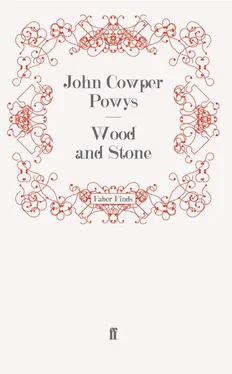“I suppose it has never occurred to you, Mr. Clavering, to go and sit, with the more interesting of your flock, at the Seldom Arms? It never has? So I imagined from my knowledge of your uncivilized English ways.
“The European café, sir, is the universal school of refined and intellectual pleasure. It was from his seat in a Roman café—a place not unknown to me myself — that the great Gibbon was accustomed to survey the summer moon, rising above the Pantheon.
“It is the same in the matter of wine as in the other matter. It is your hypocritical and puritanical fear of pleasure that leads to the gross imbibing of villainous spirits and the subterranean slavery of prostitution. If you allowed yourselves, freely, naturally, and with Christian moderation, to enjoy the admirable gifts of the supreme giver, there would no longer be any need for this deplorable plunging into insane vice. As it is — in this appalling country of yours — one can understand every form of debauchery.”
At this point Mr. Clavering intervened with an eager and passionate question. He had been listening intently to his visitor’s words, and his clear-cut, mobile face had changed its expression more than once during this long discourse.
“You do not, then, think,” said he, in a tone of something like supplication, “that there is anything wrong in giving ourselves up to the intense emotion which the presence of beauty and charm is able to excite?”
“Wrong?” said Mr. Taxater. “It is wrong to suppress such feelings! It is all a matter of proportion, my good sir, a matter of proportion and common sense. A little psychological insight will soon make us aware whether the emotion you speak of is likely to prove injurious to the object of our admiration.
“But oneself — what about oneself?” cried the young priest. “Is there not a terrible danger, in all these things, lest one’s spiritual ideal should become blurred and blighted?”
To this question Mr. Taxater returned an answer so formidable and final, that the conversation was brought to an abrupt close.
“What,” he said, “has God given us the Blessed Sacraments for?”
Hugh Clavering escorted his visitor to the corner of the street and bade him good-night there. As he re-entered his little garden, he turned for a moment to look at the slender tower of St. Catharine’s church, rising calm and still into the hot June sky. Between him and it, flitted like the ghost of a dead Thaïs or Phryne, the pallid shadow of an impassioned temptress holding out provocative arms. The form of the figure seemed woven of all the vapours of unbridled poetic fantasy, but the heavy yellow hair which most of all hid the tower from his view was the hair of Gladys Romer.
The apologist of the papacy strolled slowly and meditatively back to his own house with the easy step of one who was in complete harmony both with gods and men. Above him the early stars began, one by one, to shine down upon the earth, but as he glanced up towards them, removing his hat and passing his hand across his forehead, the great diplomatist appeared quite untroubled by the ineffable littleness of all earthly considerations, under the remoteness of those austere watchers.
The barking of dogs, in distant unknown yards, the melancholy cry of new-shorn lambs, somewhere far across the pastures, the soft, low, intermittent breathing, full of whispers and odours, of the whole mysterious night, seemed only to throw Mr. Taxater back more completely and securely upon that firm ecclesiastical tradition which takes the hearts of men in its hands and turns them away from the Outer Darkness.
He let himself quietly into the Gables garden, by the little gate in the wall, and entered his house. He was surprised to find the door unlocked and a light burning in the kitchen. The careful Mrs. Wotnot was accustomed to retire to rest at a much earlier hour. He found the good woman extended at full length upon three hard chairs, her head supported by a bundle of shawls. She was suffering from one of her chronic rheumatic attacks, and was in considerable distress.
To a less equable and humane spirit there might have been something rather irritating than pathetic about this unexpected finale to a harmonious day. But Mr. Taxater’s face expressed no sign of any feeling but that of grave and gentle concern.
With some difficulty, for the muscles of her body were twisted by nervous spasms, the theologian supported the old woman up the stairs, to her room under the eaves. Here he laid her upon the bed, and for the rest of the night refused to leave her room, rubbing with his white plump hands her thin old legs, and applying brandy to her lips at the moments when the nervous contractions that assailed her seemed most extreme. The delicate light of dawn showed its soft bluish pallour at the small casemented window before the old lady fell asleep; but it was not till relieved by a woman who appeared, several hours later, with their morning’s milk, that the defender of the Catholic Faith in Nevilton retired to his well-earned repose.
MR. QUINCUNX was digging in his garden. The wind, a little stronger than on the previous days and still blowing from the east, buffeted his attenuated figure and ruffled his pointed beard, tinged with premature grey. He dug up all manner of weeds, some large, some small, and shaking them carefully free of the adhesive earth, flung them into a wheel-barrow by his side.
It was approaching noon, and in spite of the chilly gusts of wind, the sun beat down hotly upon the exposed front of Dead Man’s Cottage. Every now and then Mr. Quincunx would leave his work; and retiring into his kitchen, proceed with elaborate nicety to stir a small pot of broth which simmered over the fire. He was a queer mixture of epicurean preciseness and ascetic indifference in these matters, but, on the whole, the epicurean tendency predominated, owing to a subtle poetic passion in the eccentric man, for the symbolic charm of all these little necessities of life. The lighting of his fire in the morning, the crackling of the burning sticks, and their fragrant smell, gave Mr. Quincunx probably as much pleasure as anything else in the world.
Every bowl of that fresh milk and brown bread, which, prepared with meticulous care, formed his staple diet, was enjoyed by him with more ceremonious concentration than most gourmands devote to their daintiest meat and wine.
The broiling of his chicken on Sunday was a function of solemn ritual. Mr. Quincunx bent over the bird, basting it with butter, in the absorbed manner of a priest preparing the sacrament.
The digging up of onions or lettuces in his garden, and the stripping them of their outer leaves, was a ceremony to be performed in no light or casual haste, but with a prepared and concentrated spirit.
No profane hand ever touched the little canister of tea from which Mr. Quincunx, at the same precise hour every day, replenished his tea-pot.
In all these material things his scrupulous and punctilious nicety never suffered the smallest diminution. His mind might be agitated to a point bordering upon despair, but he still, with mechanical foresight, sawed the fagots in his wood-shed and drew the water from his well.
As he pulled up weed after weed, on this particular morning, his mind was in a state of extreme nervous agitation. Mr. Romer had called him up the night before to the House, and had announced that his present income — the sum regarded by the recluse as absolutely secure — was now entirely to cease, and in the place of it he was destined to receive, in return for horrible clerical work performed in Yeoborough, a considerably smaller sum, as Mr. Romer’s paid dependent.
The idea of working in an office was more distasteful to Mr. Quincunx than it is possible to indicate to any person not actually acquainted with him. His exquisitely characteristic hand, admirably adapted to the meticulous diary he had kept for years, was entirely unsuited to competing with type-writing machines and machine-like type-writers. The walk to Yeoborough too, — a matter of some four or five miles — loomed upon him as a hideous purgatory. Walking tired him much more than working in his garden; and he had a nervous dread of those casual encounters and salutations on the way, which the habitual use of the same road to one’s work necessarily must imply.
Читать дальше












